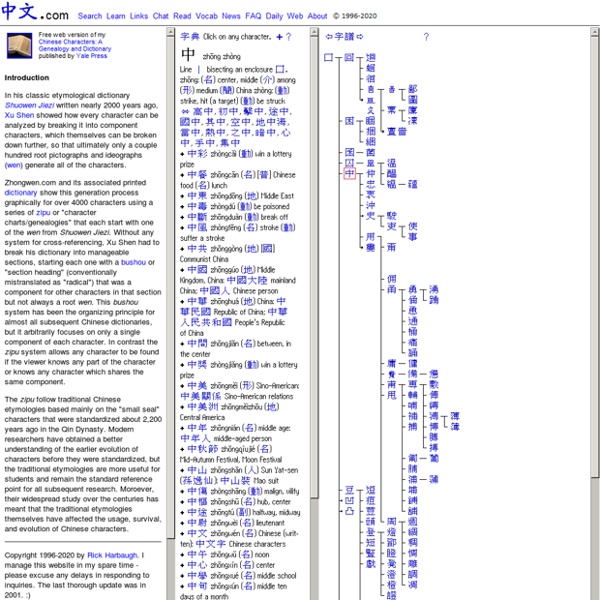



The World Factbook The Office of Public Affairs (OPA) is the single point of contact for all inquiries about the Central Intelligence Agency (CIA). We read every letter, fax, or e-mail we receive, and we will convey your comments to CIA officials outside OPA as appropriate. However, with limited staff and resources, we simply cannot respond to all who write to us. Contact Information Submit questions or comments online By postal mail: Central Intelligence Agency Office of Public Affairs Washington, D.C. 20505
Learn How to Read & Write Chinese Characters Chinese Character Tutorial If you're interested in reading and writing Chinese characters, there's no better place to get started than with the numbers 1-10. They are quite simple to write, useful to know, and are exactly the same in both the traditional and simplified writing systems. So grab a piece of paper and a pencil, give a click on the links below, and try to write the characters with proper stroke order as demonstrated: Now that you know these characters, you actually know how to read and write all the numbers through 100.
Word dictionary - MDBG English to Chinese dictionary Examples and Help Example queries: hello, nihao, ni3hao3, 你好, rest*, zei*, *zei*, *茶, 英*公司, chinese *文, "to rest", bill -gates Pinyin words should be entered without spaces, either with or without tone numbers: ni3hao3 or nihao. The character ü can be entered as v instead. The asterisk character * can be used as a wildcard to match zero or more characters: rest* will match any word starting with rest, such as restaurant or restrain*文 will match any word ending with 文, such as 中文 or 英文b*g will match any word starting with b and ending with g, such as big or boring*中国* will match any word containing 中国, such as 传统中国医药 or 中国人民 Chartres: Cathedral of Notre-Dame - Image Collection Chartres Cathedral is among the best preserved of the major French cathedrals, with extensive programmes of sculpture and stained glass. It was a major site of pilgrimage in honour of the Virgin Mary, to whom the cathedral is dedicated. This website provides access to a comprehensive collection of images and detailed descriptions of Chartres Cathedral.
Chinese handwriting recognition With this tool you can draw a Chinese character which will be recognized. Depending on your stroke order and the way you draw the character, one or more possible characters will be found. You decide which of the found characters the actual character is by selecting it. France in America / La France en Amérique About the Project Conceived in partnership with France’s national library, the Bibliothèque nationale de France, France in America /France en Amérique is a bilingual digital library made available by the Library of Congress. It explores the history of the French presence in North America from the first decades of the 16th century to the end of the 19th century. Through direct digital access to complete books, maps, prints, and other documents from the collections of the partner libraries, the project illuminates two major themes in the history of relations between France and the United States: the role played by France in the exploration and settlement of the continent and its participation in several events which indelibly marked the history of the United States: the French and Indian War, the American Revolution, and the Louisiana Purchase.
Practical Chinese Reader Vocabulary Lists In lesson order: HTML (framed version), PDF In pinyin order: HTML, (framed version), PDF In English order: HTML, (framed version), PDF Tooltip Table Text file in CEDICT format Online search tool for Web browsers, WAP browsers (mobile phones, short url: In lesson order: HTML (framed version), PDF In pinyin order: HTML (framed version), PDF In English order: HTML (framed version), PDF Tooltip Table Text file in CEDICT format Online search tool for Web browsers, WAP browsers (mobile phones, short url: In lesson order: HTML (framed version), PDF In pinyin order: HTML (framed version), PDF In English order: HTML (framed version), PDF Tooltip Table Hangman word game (requires JavaScript and CSS capable browser) Online search tool for Web browsers, WAP browsers (mobile phones, short url: Practical Chinese Reader Links The words of Book I are taken from the 1997 edition, ISBN 7-100-00088-2. The words of Book II words are taken from the 1998 edition, ISBN 7-100-00089-0.
Etymology English Senses For (英文): ju1name of a chessman in a kind of Chinese chess known as 象 棋 English Senses For (英文): che1a vehicle / a wheeled machine / to carry in a cart / to shape ( things ) on a lathe / to turn / to lift water by a water-wheel / a Chinese family name Simplified (簡體字): Unicode := 8F66 GB2312-80 := B3B5 车 New! Simplification explanation under construction.
Learn Chinese characters, translate from English to Chinese and read several Chinese classics in their original text. by nda_librarian May 7